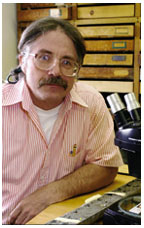
Terry McCloskey ’03
Photo: denise applewhite
 Terry
McCloskey ’03 came to Princeton as a freshman in 1972, but two years
later, unmotivated by school and yearning for a different experience,
he began a six-year trek through Europe, Africa, and the U.S. In 1980,
he settled in Belize, where he helped carve the village of St. Margaret
from the jungle, built a farm, married, and had two sons. McCloskey returned
to Princeton three years ago to finish his degree, taking jobs on the
grounds crew and with Dining Services to support his family. He is now
headed to a Ph.D. program in geography and anthropology at Louisiana State
University. He spoke with PAW’s Argelio Dumenigo about his journey.
Terry
McCloskey ’03 came to Princeton as a freshman in 1972, but two years
later, unmotivated by school and yearning for a different experience,
he began a six-year trek through Europe, Africa, and the U.S. In 1980,
he settled in Belize, where he helped carve the village of St. Margaret
from the jungle, built a farm, married, and had two sons. McCloskey returned
to Princeton three years ago to finish his degree, taking jobs on the
grounds crew and with Dining Services to support his family. He is now
headed to a Ph.D. program in geography and anthropology at Louisiana State
University. He spoke with PAW’s Argelio Dumenigo about his journey.
What was life like for you in Belize?
Simple. I lived in a thatched house, and my transport was a bicycle and a horse cart, or on horseback. I spent every day with a hoe or an ax or a shovel doing physical labor. We cooked on wood for 15 years until we finally got a gas stove. We would get water from the creek. When I got my own piece of land, it was three miles off a walking trail. I’d sometimes go a week without seeing anybody.
What made you want to come back to the U.S.?
My children’s education. My oldest son, Oaky (he’s named for the tree), was seven and had gone through two years of school. We in the village organized to build the school. It was just a little cinderblock building with a zinc roof. In Oaky’s last year, there were 52 kids in his class. They had one teacher with high school training who didn’t have enough money to buy chalk sometimes. She’d go to the board and write, “Fat rat sat on the mat.” The kids would copy it down in their notebooks, and she’d check their work one by one. He wasn’t learning anything.
But why return to Princeton after so many years?
I thought, I enjoyed it the first time, I know they’ve got a lot of money; maybe they would give me a scholarship. But even when I got on the plane in Belize, I didn’t know I was going to be coming back. My brother [Douglas McCloskey ’78] was doing all the dealings; there weren’t any phones in the village at that time. When I found out they had readmitted me and I was going to get some sort of aid, I decided to come back. Otherwise, I just would have found a job someplace.
How have things at Princeton changed since you were here last?
There are more buildings, but basically everything is the same. I think the percentage of prep-school kids has probably dropped. There is a huge difference in demographics. I don’t really hang out with students in general, but I find that the diversity is more genetic, or physical, than mental. A lot of people may have come from a different country or they’re different racially, but I don’t really see much diversity in terms of thoughts or approaches to a lot of things.
How difficult was it to be a student again?
It was hard. I don’t think the academic standards were as tough in the 1970s as they are now. I had difficulty with calculus and chemistry, especially, because I had never studied them before and because of being old. Chemistry was a killer, but I think it was the same for many students in the class.
The thing that really has changed is technology – computers. I had never even used a calculator before. When you hand in work now, it’s perfect. Back then, we typed everything, and we probably used carbon paper. You would take out a line, and you didn’t retype all 27 pages. You would scratch out the line and would hand it in like that, or you’d retype that one page and you’d have a gap at the bottom. It was tough to use my e-mail at first, too. Attaching and opening attachments was really hard for me in the beginning. I also hated doing any research on the Web at first. Before, you had to go to the library and actually find the journal to get journal articles. Now you use a search engine and find the author or the magazine, and you print it right out.
Having a family meant a lot of extra time commitments. The toughest part by far was no longer having any free time, and working to other people’s schedules. I got very little sleep the last three years and have not spent the time I would have liked with my children. Also, in Belize we would spend hours visiting with friends and talking. Here you only get an inkling of what anyone else is thinking or what someone’s life consists of.
What’s your favorite memory from your first time at Princeton?
I really enjoyed it. Not for the academics. In general, I had no interest
in studying. I enjoyed talking to all the different people. I changed
my views about a lot of stuff. Princeton’s intellectually stimulating
whether you go to class or not, you know. ![]()
